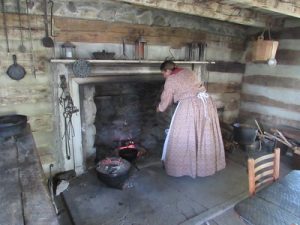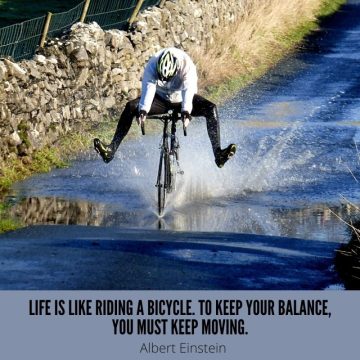Mature Living
Find your passion at any age

Age isn’t a barrier to learning new things. In fact, once you retire, you’ll have more time to explore your passions. Here are some tips for how to follow your bliss.
Ask yourself the right questions
Here are a few questions you can ask yourself to help you identify your interests:
• What did you love as a child?
• What do you enjoy talking about with your friends?
• Do you have a secret dream?
• What are you good at?
Now is the time to take up that hobby you’ve always wanted to try.
Explore the possibilities
Do you want to learn something new or increase your knowledge about a particular subject? If so, you may want to take an online course or go back to school. In addition, taking up a hobby such as swimming, walking, gardening, cooking, painting, writing, pottery, or woodworking can allow you to connect with a newfound interest.
Inspiring people
Here are three inspiring people who found success later in life:
• Colonel Harland Sanders was more than 60 years old when he succeeded in franchising his fried chicken restaurants.
• Laura Ingalls Wilder published her first novel, Little House in the Big Woods, at the age of 65.
• At 77, John Glenn became the oldest person to go into space.
Interesting Things to Know
Crafting a Joyful Retirement Beyond the Finances
The financial aspect often takes center stage when the conversation turns to retirement. However, a critical component of retirement planning goes beyond the numbers: social connectivity. As careers wind down and the daily interactions of the workplace fade, maintaining relationships becomes a task that requires intention and effort. The importance of this aspect can’t be overstated, as highlighted by an extensive 85-year study by Harvard, which revealed that social fitness is paramount to achieving a happy retirement.
The study’s findings underscore that while retirees may not miss their former jobs, they deeply miss the social connections formed in the workplace. This suggests that a fulfilling retirement involves much more than pursuing hobbies or leisure activities; it hinges on the richness of our personal connections.
Psychologists Robert Waldinger, PhD, and Marc Schulz, PhD, emphasize the importance of nurturing these connections even before stepping into retirement. They encourage reflecting on the relationships that bring joy and fulfillment and taking steps to strengthen those bonds. Appreciating and valuing the people in our lives today lays the groundwork for a socially rich retirement tomorrow.
For those already in retirement and feeling a gap in their social lives, Waldinger and Schulz offer guiding questions to help identify what connections are missing and how to foster them. Whether reaching out to someone you’d like to know better, seeking out individuals with different perspectives, or even embarking on activities you never considered before retirement, the goal is to create a diverse and enriching social landscape.
Stanley Bing, a Forbes humorist, humorously suggested establishing a “daily grind” in retirement to appreciate the joy of vacations and advised maintaining a healthy distance from becoming too entangled in family members’ daily lives. His take, while humorous, underscores the idea that retirement should be a time of personal growth and exploration.
A happy retirement is multifaceted, encompassing financial stability, personal fulfillment, and, importantly, active engagement in a social network. Cultivating and maintaining these connections enriches our lives and ensures our retirement years are vibrant and joyful.
Interesting Things to Know
Why Postponing Your Dreams Until Retirement Isn’t Necessary
Many people have a mental checklist of dreams they wish to fulfill “someday,” often relegating them to the distant future of retirement. However, the future is unpredictable, and the essence of life lies in making the most of the present. Here’s why you should consider acting on your dreams and how to approach them pragmatically.
Embrace the Present
Your current passions and interests are a reflection of who you are today. Waiting for retirement might mean missing out on experiences that could bring you joy and fulfillment now. Whether it’s traveling to a dream destination, pursuing a hobby, or embarking on a new career path, these experiences can enrich your life in invaluable ways.
Evolution of Self
As you age, your interests and abilities evolve. The dreams you have now may not hold the same appeal in the future. Moreover, the energy and health you possess today are not guaranteed later. Embracing your aspirations now ensures that you live a life filled with experiences that matter to you personally.
Planning Your Dream
Realizing your dreams requires planning, especially when it comes to financial and time commitments. Here are steps to turn your dreams into reality:
- Set Clear Goals: Define what you want to achieve. Be specific about what your dream entails and why it’s important to you.
- Seek Professional Advice: A financial advisor can help you understand the financial implications of your dreams and how to achieve them without compromising your future security.
- Create a Timeline: Establish a realistic timeline for achieving your goals. Breaking down your dream into smaller, manageable steps can make it more attainable.
- Consider Flexible Work Options: If your dream requires significant time away from work, discuss flexible work arrangements with your employer. This might include part-time work, remote work, or a sabbatical.
Empower Yourself
Giving yourself the means to achieve your dreams might also involve personal development. Whether it’s acquiring new skills, improving your health and fitness, or expanding your knowledge, investing in yourself is crucial for making your dreams a reality.
Take the Leap
Making your dreams come true is about more than just personal fulfillment; it’s about living a life with no regrets. It’s about making memories that you’ll cherish and stories you’ll share. So, why wait? With the right planning and mindset, you can start working towards your dreams today, ensuring that when you do reach retirement, you’ll have a wealth of experiences that make life truly rich.
Mature Living
Legal and Estate Planning Essentials for Moving to a Retirement Home
Transitioning to a retirement home is a pivotal moment that necessitates thorough preparation, especially when it comes to legal and financial planning. Here’s a roadmap to guide you through the essential legal and estate considerations for this significant life change.
1. Document Review: Ensure your will, power of attorney, and healthcare directives are up-to-date, reflecting your current wishes and circumstances. This foundational step secures your future intentions and care preferences.
2. Contract Clarity: Before signing any contracts with the retirement home, consult a lawyer to understand the specifics of your agreement. This includes rights, obligations, fees, and any restrictions, ensuring no surprises down the line.
3. Financial Assessment: Carefully evaluate your financial situation to ensure you can comfortably afford the retirement home fees. Consider consulting a financial advisor to explore long-term funding strategies and options.
4. Asset Management: Decide on the future of your property and other significant assets. Align these decisions with your overall estate plan to ensure a cohesive strategy.
5. Healthcare and Tax Planning: Review your healthcare coverage to ensure it meets your needs within the retirement home. Also, consider the potential tax implications of any changes and seek professional advice to navigate these complexities.
6. Inheritance Intentions: Have a candid discussion with a legal professional about your inheritance wishes, considering how moving to a retirement home might impact asset distribution among your heirs.
7. Open Family Dialogue: Communicate your plans and decisions openly with your family members. This ensures everyone is on the same page and can support you through the transition.
8. Professional Guidance: Engage with legal, financial, and tax professionals for personalized advice tailored to your situation. Their expertise can help you navigate the legal and financial intricacies of moving to a retirement home.
Addressing these considerations not only ensures a smoother transition to retirement living but also protects your interests and provides peace of mind for you and your loved ones during this significant life change.
Interesting Things to Know
Finding Love After 50: A Guide to New Beginnings
The quest for love and companionship is a timeless adventure that certainly doesn’t end at 50. In fact, for many, this can be an exciting new chapter in the journey of love. If you’re over 50 and looking to meet your soulmate, here are four empowering tips to guide you along the way.
1. Broaden Your Social Horizons
Opening yourself up to new experiences is key to meeting new people. Whether it’s joining a club, taking a class, or exploring online dating, stepping outside your usual social circle can significantly increase your chances of meeting someone special. Websites and apps specifically designed for those over 50 can provide a comfortable platform for connecting with others who share your interests and life experiences.
2. Embrace New Opportunities with Openness
Keeping an open mind is essential when looking for love later in life. Be receptive to new experiences, say yes to invitations, and be willing to explore unfamiliar territories. Love often arrives in unexpected ways, and staying open allows you to seize opportunities that could lead to meaningful connections.
3. Cultivate Self-Confidence
Self-love and acceptance are incredibly attractive qualities. Embrace who you are, including every gray hair and laugh line, as they are testaments to your life’s journey. Taking care of your physical and mental well-being can boost your self-confidence, making you more appealing to others. Remember, confidence is not about being flawless; it’s about being comfortable in your own skin.
4. Take Your Time
Patience is vital in the search for a compatible partner. Resist the urge to rush into a relationship. Instead, invest time in getting to know someone, allowing the connection to develop naturally. Healthy relationships are built on mutual respect, shared interests, and genuine affection, so let things unfold at their own pace.
Exploring In-Person Dating Options
For those who prefer meeting potential partners in person, there are plenty of options:
- Travel Agencies for Singles Over 50: These agencies offer trips and cruises designed specifically for single seniors, providing a fun and relaxed environment to meet others.
- Leisure Clubs and Groups: Joining clubs that cater to your interests can connect you with like-minded individuals.
- Local Social Events: Keep an eye out for events or gatherings in your community that are geared toward your age group.
Finding love after 50 is not just possible; it can be a thrilling and fulfilling experience. By expanding your social network, embracing new experiences with an open heart, building confidence in yourself, and nurturing connections, you’re setting the stage for a beautiful partnership. Remember, finding someone with whom you can share life’s adventures is never too late.
Mature Living
Keeping Family Bonds Strong in Retirement Homes
Living in a retirement home doesn’t mean family connections should fade. In fact, maintaining these bonds is crucial for the well-being of seniors. Here are three effective ways families can stay close and keep the warmth of family ties alive, even when apart.
1. Prioritize Face-to-Face Time
Nothing replaces the joy of in-person visits. Regularly scheduled family visits provide something for seniors to look forward to and help maintain a strong sense of belonging and family unity. These moments are precious, whether it’s a simple lunch together, a stroll in the garden, or attending a facility-hosted event.
2. Leverage Technology for Connection
In today’s digital age, staying in touch has never been easier. Video calls, social media, and instant messaging allow families to share life’s moments in real time. For seniors less familiar with technology, family members or retirement home staff can assist in setting up these digital lifelines. Don’t underestimate the power of a traditional phone call or the charm of receiving a handwritten letter either; both are deeply personal ways to communicate love and care.
3. Engage in Community Events Together
Many retirement homes host events and activities designed to enrich the lives of their residents. Participating in these with your loved ones supports their involvement in community life and creates shared memories. Whether it’s a holiday celebration, an art class, or a musical performance, joining in these activities can significantly enhance the quality of your visits.
Combining these approaches helps maintain strong family ties and enriches seniors’ lives in retirement homes. By staying connected, families can ensure their loved ones continue to feel valued, loved, and emotionally supported throughout their golden years.
Mature Living
Birdwatching for Seniors: A Guide to Starting Your Avian Adventure
Birdwatching is a serene and engaging hobby that combines the joy of being outdoors with the thrill of discovering nature’s beauty. Birdwatching offers the perfect blend of relaxation and excitement for seniors looking for a leisurely yet fulfilling pastime. Here’s how you can embark on your own birdwatching journey.
1. Gather the Essentials
The first step to beginning your birdwatching adventure is to equip yourself with the right tools. A quality pair of binoculars is crucial for spotting birds from a distance without disturbing them. Look for binoculars that are comfortable for you to hold and provide clear, bright images. Additionally, a birding guidebook specific to your region will help you identify various species and understand more about their habits and habitats. These items are readily available at outdoor supply stores or online.
2. Choose Your Birdwatching Spot
One of the many delights of birdwatching is that you can do it almost anywhere. Your backyard or neighborhood park can be excellent places to start. If you’re up for a bit more adventure, visiting local nature reserves, forests, or coastal areas can provide a wider variety of birds to observe. Remember, the key is to find a spot where you feel comfortable and can enjoy the tranquility of your surroundings.
3. Timing Is Everything
Birds are most active during the early morning and late afternoon, making dawn and dusk ideal for birdwatching. During these times, birds are typically feeding and are more visible. Planning your birdwatching sessions around these times will increase your chances of spotting a wide variety of birds.
4. Observe and Note
As you begin to encounter different birds, take the time to observe their unique characteristics. Note their size, color, behavior, and any distinctive markings. Keeping a birdwatching journal can enhance your experience, allowing you to record your sightings and track the different species you’ve observed over time. This practice not only aids in identification but also adds a personal touch to your birdwatching adventure.
5. Share the Experience
Birdwatching can be a wonderful way to connect with friends and family who share your interest. Joining a local birdwatching club or group can also be a great way to meet like-minded individuals and learn from more experienced birdwatchers. Sharing your discoveries and experiences with others can make birdwatching even more rewarding.
Birdwatching is more than just a hobby; it’s a gateway to appreciating the intricate beauty of nature and the diversity of avian life. It encourages patience, attentiveness, and a deeper connection with the natural world. So why not grab your binoculars, step outside, and let the world of birds captivate your curiosity and imagination? Who knows what fascinating creatures you’ll encounter on your avian adventure!
























































































